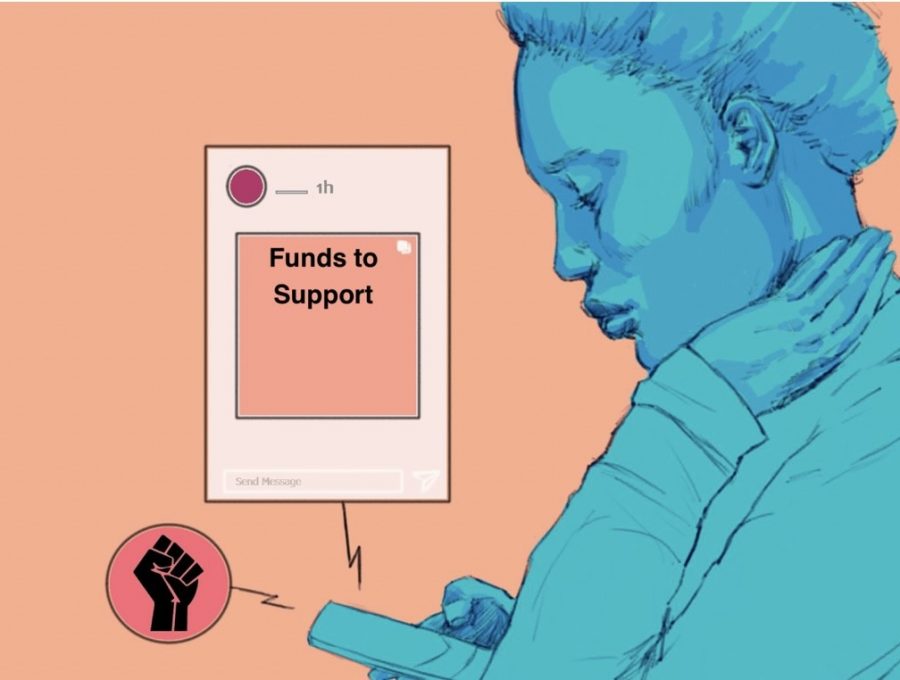When you protest for content instead of the cause
Murder of George Floyd results in “social media activism” to protest for change
Photo by Submitted
The term “fake activism” sparked in June and is often associated with clicktivism. This is the act of supporting a political or social cause by posting online petitions or resources on social media and is sometimes characterized by involving little effort.
If you told me in Nov. 2019 that in one year, I would become the person I am today, I would call your bluff.
Many of us have become entirely different people than who we were in November of last year, from changing our appearances, to becoming radicalized political activists.
I think the most significant change that our generation has experienced is a newfound passion for political activism.
After the murder of George Floyd on May 25 in Minneappolis, Minn., I was also eager to show my support.
Minnesota is my home and this summer, I sprung into action when I discovered that someone who lived in the same city as me could be killed without repercussions.
I remember driving up to Minneapolis and seeing the ocean of people gathering around city hall. It was people of all ages, all races and all backgrounds standing together and protesting together, sweating in the hot summer sun together.
While I felt good about myself, I was ignorant.
I remember driving back one day from a protest and talking to one of my Black friends, Marcus Keller, a junior at the university of Lacrosse who attended the protest with me.
I remember saying that “I thought things were better.”
He just shook his head and I knew that it wasn’t the first, and most likely won’t be the last, time he would have to reply to this statement.
“It’s never been better,” Keller said, “it’s always been like this. This isn’t the first time a Black person has been murdered and it has caused an uproar. White people will protest with us and post black squares on Instagram in solidarity but eventually white people will stop coming, they will continue to post ‘Black Lives Matter,’ for awhile but it eventually dies down and nothing changes and the cycle continues.”
At this moment, all I felt was shame. I felt destined to let him down and it was his mention of social media activism that showed this reality to me.
Since Floyd’s death, more people have posted about political and social issues online.
The intention behind these posts is good, as people share resources on how to vote or how to support Black, Indigenous and people of color.
However, problems arise when all a person does is post on social media.
The term “fake activism” sparked in June and is often associated with clicktivism. This is the act of supporting a political or social cause by posting online petitions or resources on social media and is sometimes characterized by involving little effort.
The “posting of black squares on Instagram” that my friend mentioned is one example of how clicktivism is dangerous.
Many Black Lives Matters’ members criticized the #BlackoutTuesday trend that occurred following Floyd’s death, pointing out that the posts were clogging up critical sources of information by using #BLM to post black squares.
This is a great example of activism that is coming from a good place, but ends up silencing the movement instead of amplifying it.
Another significant problem is people believing that merely retweeting or posting activist media online is enough.
It’s not.
Using social networking as one’s only form of spearheading change is not enough.
I know those who use clicktivism have their hearts in the right place and I am not telling you to stop. I am telling you that this world is full of possibilities.
We need to take advantage of every opportunity to make a meaningful impact. If you hear about a protest that is centered around a cause you care about, go to it and also encourage your friends to go.
If you believe in #BLM, go to a protest, if that isn’t possible because of the pandemic find a way to speak to the incredible Black men and women who organize these BLM events and petitions.
Posts online from your white friends will not educate you on the experiences of Black people. I cannot educate you on the experiences of Black people.
You must speak to Black people, ask what you can do to be an ally and they will tell you exactly what you can do to make a difference and what not to do.
Stop using political and social posts as your only form of activism.
As the journalist and neuroscientist Morgan Levy said, “turn down the retweets and turn up the philanthropy instead.”
Hinrichs can be reached at HINRICHA0521@uwec.edu.

Allison Hinrichs is a third-year journalism and multimedia communication student. This is her fourth semester at The Spectator. Allison loves being outdoors and anything that gives her an adrenaline rush. She loves hiking, rock climbing, snowboarding and photography.


